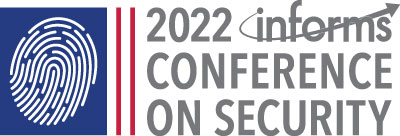| 9-10:10am |
Keynote: Joannes O. Royset, Naval Postgraduate School |
| 9:30am-4:15pm |
Exhibit Hall open |
| 10:10-10:30am |
Coffee break |
| 10:30am-12noon |
Parallel Sessions TA
Track 1
- Allocating Continuous Protection Resources to Facilities when the Effect of Protection is Uncertain
- Network Resilience Models for Security Applications: Beyond Density and Degree-ness
- Solution Support Systems for Managing Rolling Crises
Track 2
- Resource Coordination for Network Flow Interdiction
- Strategic Coordination of Detection Resources for Monitoring Critical Infrastructure Networks Against Attacks
- Multifirm Models of Cybersecurity Investment: Competition vs. Cooperation
Track 3
- Improving Logistic Regression on the Imbalanced Data by a Novel Penalized Log-likelihood Function
- Wavelet-based Architecture for Data Confidentiality, Integrity, and Availability
- Predicting Public Knowledge of Secure Cyber Practices
- Differentially Private Federated Learning: Algorithms and Open-source Software Framework
Track 4
- Planning for Army Readiness Using Lot Streaming
- Convoy Resupply Planning Using Fixed-parameter Tractable Algorithms for Lot-sizing with Heterogeneous Ground Vehicles
- Optimal Allocation of Tactical Search Units in Undersea Warfare
|
| 12noon-1pm |
Lunch |
| 1-2:30pm |
Parallel Sessions TB
Track 1
- Unsupervised Hunting of Anomalous Commands (UHAC) Framework
- Unsupervised Detection of Anomalies Using Word2Vec
- Implementing AI in Forecasting Cybersecurity Threats
Track 2
- Dine In or Take Out? Trends on Restaurant Service Demand Amid the COVID-19 Pandemic
- Predictive Resilience of Interdependent Water and Transportation Infrastructures: A Sociotechnical Approach
- Stochastic Optimization and Generalized Disjunctive Programming Applied to Power System Dynamics for
Grid Resilience
- Distributionally Risk-receptive and Risk-averse Network Interdiction Problems with General Ambiguity Set
Track 3
- Systems Resilience Enhancement and Time-based Stochastic Process of Contingencies in Networked Microgrids
- Improving Resilience of Cyber-physical Systems with Data-driven Prior
- Algebraic Topology of Power Grid Resilience: Persistence Homology Technique
Track 4
- Continuous Patrolling Games
- Reducing the Frequency and Lethality of Mass Attacks
- Impacts of Communication Structures on Infrastructure Systems Resilience: An Agent-based Simulation Approach
|
| 2:30-2:45pm |
Coffee break |
| 2:45-3:40pm |
Keynote: Rajan Batta, University at Buffalo |
| 3:40-4pm |
Coffee |
| 4-5:30pm |
Parallel Sessions TC
Track 1
- Probabilistically Resilient Multi-robot Informative Path Planning
- Attacker-defender Maximum Coverage Location Problem with Partial Coverage and Spatial Demand
- Multiple Camera View-frame Placement in the Presence of an Adversary
Track 2
- Supply Chain Cybersecurity and Resilience for Internet of Things
- Information Flow in Blockchain Enabled Supply Chain Using Hyperledger
- Hybrid Supplier Risk Assessment and Identification Methodology for Government Purchasers
Track 3
- Electric Power Grid Resilience to Insider Threats
- Monodromy vs. Homotopy in Power Flow Algebraic Solution in Real-time Operation of Electric Power System
- Transfer Learning for Enhancing Power System’s Stability and Security Under Planned Network Topological Changes
- Understanding the Impact of Zero-day Cyberattack on Electric Mobility-on-demand System
Track 4
- A Verification Framework for Certifying Learning-based Safety-critical Aviation Systems
- Semantic AI Security in CPS: The Case of Autonomous Driving
- Online Learning-based Model Predictive Trajectory Control for Connected and Autonomous Vehicles
- Small Unmanned Aerial Systems (sUAS) Technology Testbed Enabling Homeland Protection Missions
|


